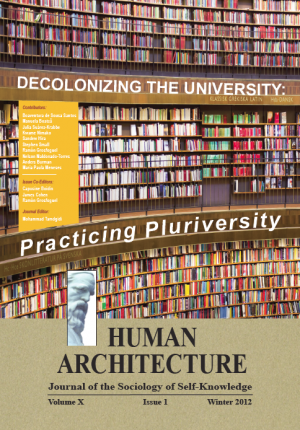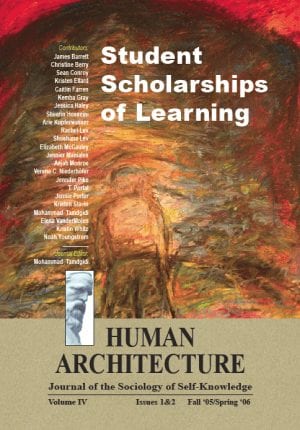Journal Article — Editor’s Note: Reflections on Fanon — by Mohammad H. Tamdgidi
$15.00
This Special (Summer 2007) Issue of Human Architecture: Journal of the Sociology of Self-Knowledge includes the proceedings of the fourth annual Social Theory Forum (STF), held on March 27-28, 2007, at UMass Boston. The theme of the conference was “The Violences of Colonialism and Racism, Inner and Global: Conversations with Frantz Fanon on the Meaning of Human Emancipation.”
Description
Abstract
This Special (Summer 2007) Issue of Human Architecture: Journal of the Sociology of Self-Knowledge includes the proceedings of the fourth annual Social Theory Forum (STF), held on March 27-28, 2007, at UMass Boston. The theme of the conference was “The Violences of Colonialism and Racism, Inner and Global: Conversations with Frantz Fanon on the Meaning of Human Emancipation.”
Frantz Fanon (1925-1961), the revolutionary Martinique-born French psychiatrist, thinker, and activist—and author of the classics Black Skin, White Masks (1952) and The Wretched of the Earth (1961)—spent a significant part of his short life understanding the nature of colonialism and racism and their effects on the indigenous cultures of the colonizers and the colonized, and their psyche. Colonialism and racism do not stop at one’s skin, he observed, but penetrate the deepest recesses of one’s psyche regardless of where one stands on the colonial and racial lines. Equipped also with insights into how the oppressed have historically resisted and challenged the cultural and psychological effects of colonialism and racism, Fanon prescribed courses of action involving psychological and socio-political education and activism through writing and participation in liberatory movements (especially in the Algerian context)—approaches that have informed the tumultuous decades of debates following his passing and still inspire scholars and activists alike to simultaneously combine inner and global inquiries into the nature of oppression and liberation.
Recommended Citation
Tamdgidi, Mohammad H. 2007. “Editor’s Note: Reflections on Fanon.” Pp. ix-x in Reflections on Fanon: The Violences of Colonialism and Racism, Inner and Global—Conversations with Frantz Fanon on the Meaning of Human Emancipation (Human Architecture: Journal of the Sociology of Self-Knowledge: Volume V, Special Issue, 2007.) Belmont, MA: Okcir Press (an imprint of Ahead Publishing House).
The various editions of Reflections on Fanon: The Violences of Colonialism and Racism, Inner and Global—Conversations with Frantz Fanon on the Meaning of Human Emancipation can be ordered from the Okcir Store and are also available for ordering from all major online bookstores worldwide (such as Amazon, Barnes&Noble, and others).
Read the Above Publication Online
To read the above publication online, you need to be logged in as an OKCIR Library member with a valid access. In that case just click on the large PDF icon below to access the publication. Make sure you refresh your browser page after logging in.








